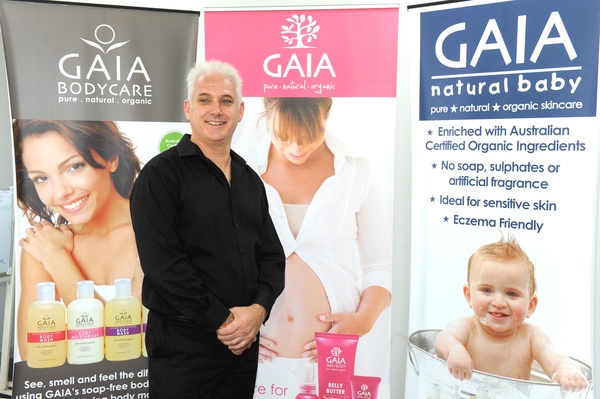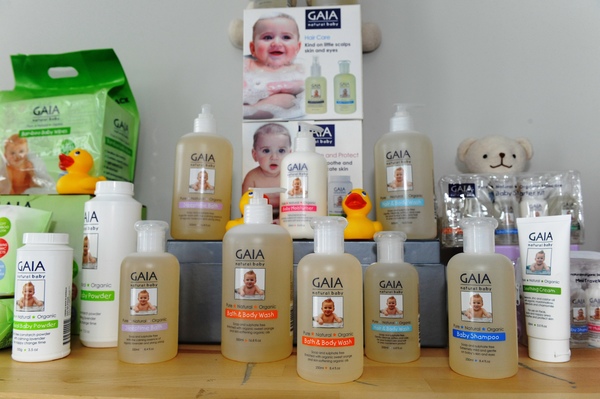By Rebecca Skilton
After discovering her son had eczema at just eight weeks of age, Michelle Vogrinec embarked on skin care blending and aromatherapy studies to begin creating her own herbal infusions.
Now, 18 years on, Michelle and husband Simon export their Gaia Skin Natural products to over 24 countries – and they’re still growing.
Based in Hallam, Gaia Skin Naturals caters for the whole family with products specifically created for babies, men, women and women’s pregnancy and breastfeeding journeys.They produce 42 products across 31 lines and four brands, are sold in over 5500 pharmacies, health food, baby stores, leading grocery shops and online outlets, continue to be manufactured in Australia (excluding their Bamboo Baby Wipes) and are continuously increasing their international customer base.
So how did the Vogrinecs’ take their home-made remedy worldwide?
“It’s an interesting journey because for us, export was never the focus of the business. For us, it was being able to provide a quality product to our customers,” Simon, who is now the General Manager of Gaia, said.
“Around 2002 we went to market and started knocking on doors of pharmacies. We got into about three or four hundred in a very short period of time and we were successful in enlisting a couple of big chains.
“We started becoming a little bit more well-known in the marketplace and (around 2003) we put together the website. Once we did that we started getting inquiries come in in relation to export.”
While Michelle and Simon were successful in establishing a Australian brand profile and admit they entered the marketplace at a time when ‘the natural health area was becoming more and more prevalent,’ Simon does acknowledge that if he had his time again, he would tackle the export process differently.
“Export has its own advances and challenges,” Simon said.
“In the early days, we were everything to everybody and jumped on every opportunity, which then resource wise, pulls you different places and can put strain and pressure on. So now we pick a few markets, we go in and we actually understand the demographic of who we’re selling to.
“For us it’s about sustainability; going in and capturing the market and understanding what’s involved in the marketplace before pulling back so we can strategize and think, ‘okay, what’s required in the investment of this?’ Whether it’s financial wise, resource wise, marketing wise, trade visits – there’s a whole heap of things that we have to think about as we go forward.
“Because there’s no point going into a market place if you can’t sustain it. There’s no point in going in if you can’t resource it and you can’t build your brand. Otherwise you’re here today and gone tomorrow.”
Understandably, the export process exponentially increased the Vogrinecs’ workload with different marketplaces obtaining different rules and regulations. However, the Gaia message is kept as uniform as possible and product formula is unwavering.
Which is why Gaia will not sell business-to-business within China; a country which requires cosmetics to be tested on animals prior to distribution.
“China’s a really interesting one,” Simon said.
“Our company stance has always been that we won’t test on animals and we won’t allow our product to be tested on animals.
“But one third of the population is in China. It’s a massive, massive market … and what’s happened over the past couple of years is that things have changed (there). The consumer in China wants quality products and they have issues with domestic produced products. They don’t – trust I think is probably the right word – that what they’re buying in their marketplace is always quality.”
Simon explained that consumers in China are becoming increasingly attracted to Australia’s ‘clean, green eco-friendly’ reputation, thus placing greater trust in Australian products such as Gaia.
And while China’s government is yet to change their stance on animal-testing, businesses like Gaia can reach the Chinese marketplace as long as it’s through a business-to-consumer exchange rather than a business-to-business interaction.
Within China, business-to-consumer exchanges have become increasingly popular following the rise of initiatives such as one-day online flash sales and bonded warehouses, which offer channels for ‘temporary exemptions for tariffs and other regulatory requirements which apply to conventional international trade.’
“We can get into China but not through our normal distribution model,” Simon said.
“We can service it, but we can’t be actively procuring or building the brand. The online area has been fantastic in being able to gain access to the market and be able to service the consumer need, but we’re not able to step through it and actually build the business properly.
“At some point we’ll be able to move into the China marketplace, but we’re not going to change our ethical standing point”
.And any advice for Australian businesses looking towards exporting?
“I would say you need to understand what’s involved in export because there are big risks in there,” Simon said.
“People say, ‘oh that’s easy, you put it on a boat and you ship it.’ Yes you do, but you have to make sure everything’s right. There are risks.
“So minimising those risks, understanding what you’re getting yourself into and the questions of how, what and why you’re doing it are really important.”








